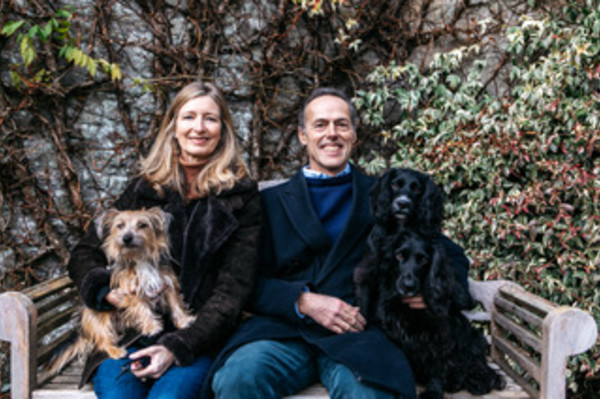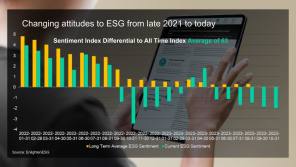

Yet Mr Swiderski, who has been married to environmentalist Camilla Swiderska for more than 30 years, is acutely aware that this slice of Eden, together with the rest of our planet and our savings and investments, are drastically under threat from climate change and wider environmental degeneration.
Wondering what could be done to make a difference in terms of a positive, practical solution to the problem of environmental devastation, and realising that the finance sector could play a key part, Mr Swiderski and good friend Jasper Judd founded the Climate Crisis Foundation two years ago.
Last year, the CCF launched the Global Returns Project – an initiative that will mobilise financial advisers, and others managing wealth and investments in the finance sector, to position themselves as a key part of the answer to climate change.
Mr Swiderski explains: “Climate and ecological crises are major threats – not only to the environment and human welfare, but also to investments and for businesses.”
He says that “driven by corporate responsibility, client demand and competitive pressure, the investment community is adapting – introducing [environmental, social and governance] and impact funds, setting new environmental standards for the industry, and also by lobbying governments. But the scientists are telling us we all need to act faster”.
So the CCF started to think about the solutions.
“The good news is that many of the most effective climate solutions are already available,” Mr Swiderski says. “There are hundreds of amazing not-for-profit organisations working on the climate crisis in areas like conservation, reforestation, renewables and advocacy.”
Nature-based solutions alone, if they were properly funded, could be sequestering 11bn tonnes of CO2 every year – that is more than 20 per cent of human emissions.
Seeing that private investors globally own financial assets worth around $140tn (£101tn), the CCF realised that if only three in 100 savers decided to allocate as little as 0.25 per cent of their portfolios to not-for-profits, that would raise $10bn every year for the climate.
‘Reinvesting in earth’
Armed with this knowledge, the CCF thoroughly researched more than 130 climate not-for-profit organisations and selected some of the most effective and most scalable.
CCF chose six of the best, through rigorous assessment, and now clients can donate to these not-for-profits through the Global Returns Project. The chosen charities are currently Ashden, Client Earth, Global Canopy, Rainforest Trust, Trillion Trees and Whale and Dolphin Conservation. This is what CCF calls “reinvesting in earth”.
Mr Swiderski says: “We believe there is an opportunity for wealth managers, advisers, banks and other financial institutions to take significant action by enabling their clients to support these not-for-profit climate solutions in an easy way.”
This can be done very simply. He continues: “If everyone with savings and investments, was given the option by their IFA to tick a box every year to automatically give a tiny proportion of their money to solve some of these problems, then a good number of people would do that.
“Behavioural research tells us that if this choice is presented to us in that context, so that it is a normal and easy thing to do, then many of us will participate and choose to reinvest in earth,” Mr Swiderski adds.
This is how it is in the best long-term interest of clients, and how they can stay ahead of developments in ESG. The charities selected by the Global Returns Project provide a function that market mechanisms can never achieve.
Building a more sustainable world
While the market tends to deplete natural resources and exploit the environment, the selected charities in the Global Returns Fund use natural processes to build a more sustainable world.
They go hand in hand with a switch to ESG investing, but make ESG funds even more effective, adding an additional layer of protection around them.
Mr Swiderski calls this enhancement of ESG funds “symbiotic wealth management”. Whereas ESG investments help negate risk, and counter environmental degeneration, symbiotic wealth management is about investing in ESG and then donating a tiny percentage of those savings to protecting and enhancing those ESG investments.
Because CCF is a registered charity, there is virtually no cost to the adviser. All transaction charges are absorbed by the CCF, so 100 per cent of the money sent when people reinvest in earth goes to their charity partners
“Investing in these projects delivers real identifiable returns. The returns are externalised and global, but they are real,” he says.
“Decarbonising the economy is not enough. We have to invest in natural systems that drawdown CO2, every day of every year.
“In symbiotic wealth management, the sustainable portfolio generates returns, and a portion of that can be used for the not-for-profit allocation, and the not-for-profit allocation in turn protects and enhances the entire biosphere to make all our lives and activities sustainable. If we can address these crises, then all investments become less risky.”
Logical piece of advice
Mr Swiderski says that for advisers, the Global Returns Project forms a logical piece of investment advice.
The risks are clearly identifiable, in terms of risks to our economic systems, like our investments. This is a logical response to the crisis we are facing, and if we can reduce risk to the earth’s system we reduce the risk to all of our systems.
Advisers and financial institutions who enable their clients to take part would be making a real difference, without affecting their fees or performance figures.
“You’ll be doing more than helping them save their money. You will also be helping your clients shape the future of a world that is worth saving for,” Mr Swiderski says.
"You’ll be giving your clients an answer to the question we are all asking for: 'What can I do to help solve the climate crisis?’”
The Covid-19 pandemic is a tragedy for so many. It has also shown us how perceived barriers can disappear and how we can change systems in an emergency.
Just like the pandemic, the climate crisis will not resolve itself. It will require some changes. But here is some good news.
Mr Swiderski believes that not only is the industry and its clients, ready for change, “we also now know that we can change things, and fast. We are on the brink of a breakthrough”.
He says: “Savers and investors want to do this and we need IFA co-operation to make this easy and normal for everyone.
“When faced with this planet-sized problem, you are not helpless, advisers can help their clients each take personal action.”
To find out more visit www.globalreturnsproject.earth or email Yan@globalreturnsproject.earth
Anita Boniface is a freelance journalist



